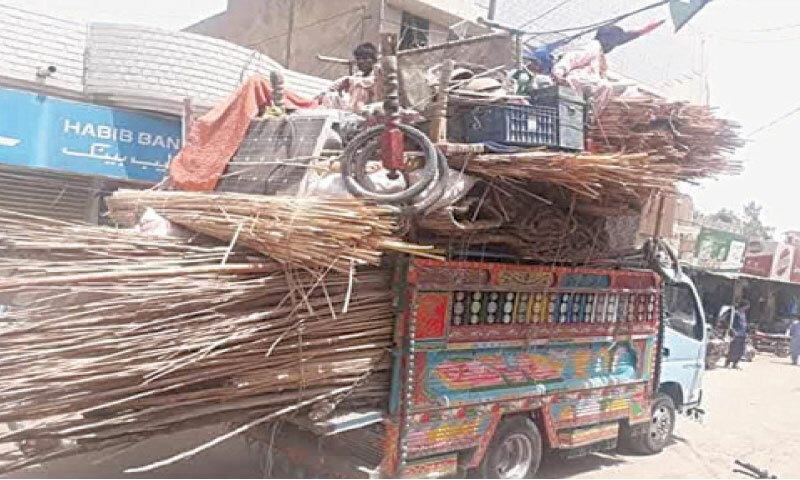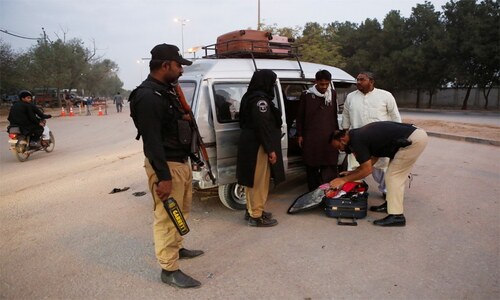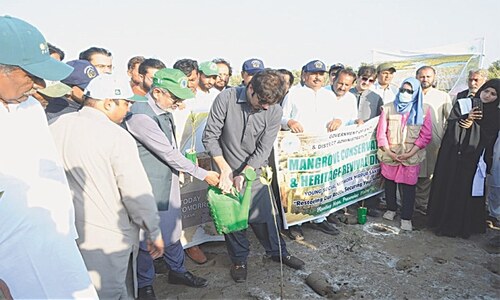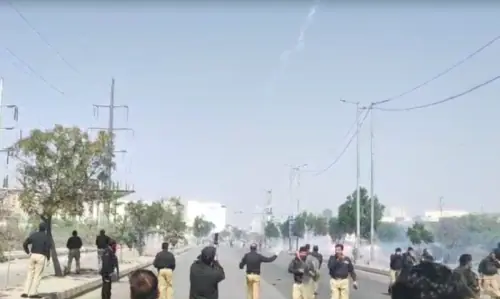THATTA: A serious lack of livelihood opportunities, severe water scarcity and increasingly unpredictable weather patterns have triggered a wave of internal migration which is fast emptying villages and small towns in the coastal districts of Thatta, Sujawal and Badin.
The crisis, a slow-burning disaster exacerbated by climate change, has accelerated a decades-long decline, transforming once-fertile lands into saline wastelands and decimating traditional livelihoods.
Hassan Abbas, environmental expert and advocate for water resources, revealed in an interview with Dawn that the construction of Ghulam Mohammad Barrage and reduced water flow were key factors for drastic reduction in water flow downstream Kotri. Constructed in 1956 and commissioned in 1958, the barrage, while intended for upstream irrigation, had effectively choked the lifeblood of the delta, he said.
He said: “When the Ghulam Muhammad Barrage at Kotri became operative, the fate of the delta was sealed”.
He highlighted how freshwater flows ceased in the channels “except for brief periods during flood season” and led to widespread seawater intrusion, rendering once-fertile agricultural lands saline and unsuitable for cultivation.
Abbas cited recent studies indicating that up to 1.2 million acres of land in Thatta and Badin had been swallowed by the encroaching sea, with significant portions of agricultural land becoming barren due to insufficient freshwater.
The impact on the traditional fishing communities, the backbone of the delta’s economy, had been devastating, he said.
Iqbal Khaskheli, social activist and local chairman in coastal town of Mirpur Sakro, said that the scale of ecological collapse was staggering.
Indus Delta, once among the world’s largest and most fertile, had shrunk by a staggering 92 per cent since 1883, dwindling from 12,900 square kilometres to less than 1,000 sq kms by 2018, he said.
Historically, he said, the delta received approximately 150 million acre feet (MAF) of water and over 400 million tonnes of sediment annually. Today, in dry years, this had plunged to as low as 1.5 MAF, with sediment flow reduced to a mere 26–30 million tonnes, he said.
He said that the delta, which had been reduced to a mere skeleton of its past, was unable to replenish itself, falling victim to erosion and sea intrusion. Since 1956, the Arabian Sea had devoured an estimated 3.5 million acres along the Sindh coast, he said.
Masood Lohar, founder of Clifton Urban Forest, emphasised the profound impact on livelihoods. “The reduction in freshwater flow has destroyed fish breeding grounds, led to a decline in commercially important marine species like the Palla fish, and severely impacted mangrove forests – crucial nurseries for aquatic life and natural barriers against sea intrusion.”
This, he explained, had decimated the livelihoods of thousands of fishermen who had historically relied on the delta’s rich bounty.
The human cost is palpable. Aziz Lashari, a displaced fisherman now residing in a congested Karachi slum, expressed his anguish in the following words. “Our fathers and grandfathers fished these waters for generations, but now there is nothing,” he said.
His voice, heavy with despair, echoed the sentiments of countless others. “The sea has advanced so much, and the freshwater is gone. We used to catch enough to feed our families and sell in the market. Now, we are beggars in our own land,” Lashari groaned.
“It’s not just about fish or farming. The very fabric of their lives is unraveling. Drinking water is scarce and often brackish, health issues are on the rise, and children are deprived of education as families struggle to survive. We’ve seen entire villages become ghost towns,” said Lashari.
Faiz Sindhi, another displaced fisherman, noted a significant increase in migration from Thatta, Sujawal and Badin districts to areas like Ibrahim Hyderi in Karachi, with hundreds of fishermen having relocated. “But the city can’t absorb this influx. It’s leading to slum expansion, resource stress, and social unrest,” he said.
Sindhi highlighted the broader environmental degradation, including the discharge of poisonous industrial and agricultural waste into the delta, compounding the crisis. “We’ve lost everything — land, water, honour,” he lamented.
“This isn’t migration. It’s environmental eviction,” he said. This wave of climate-induced migration was not only uprooting rural communities but also further burdening the country’s already stressed urban centres, which were grappling with shrinking civic amenities, rising unemployment, unaffordable housing, and fragile infrastructure, he said.
Faiz Sindhi said that climate change had accelerated Himalayan glacier melt—retreating at nearly 15 meters per year—temporarily increasing river flows but threatening long-term water stability.
Meanwhile, sea levels in South Asia were rising at 3.7 mm per year, a rate that had reportedly doubled over the past two decades. Under high-emissions scenarios, this could rise up to one meter by 2100, further pushing saltwater inland and undermining coastal resilience, he said.
Abdullah Jat, a fisherman from Shahbandar, said that restoring the delta, required more than mangrove planting on coastal embankments. The core solution rested in ensuring a minimum of 10 MAF of freshwater flow downstream of Kotri — a demand repeatedly voiced but seldom met.
This, however, required confronting politically-motivated water distribution agreements and rethinking upstream irrigation priorities and urgently calling for a comprehensive and coordinated approach from the government.
Published in Dawn, June 12th, 2025
































